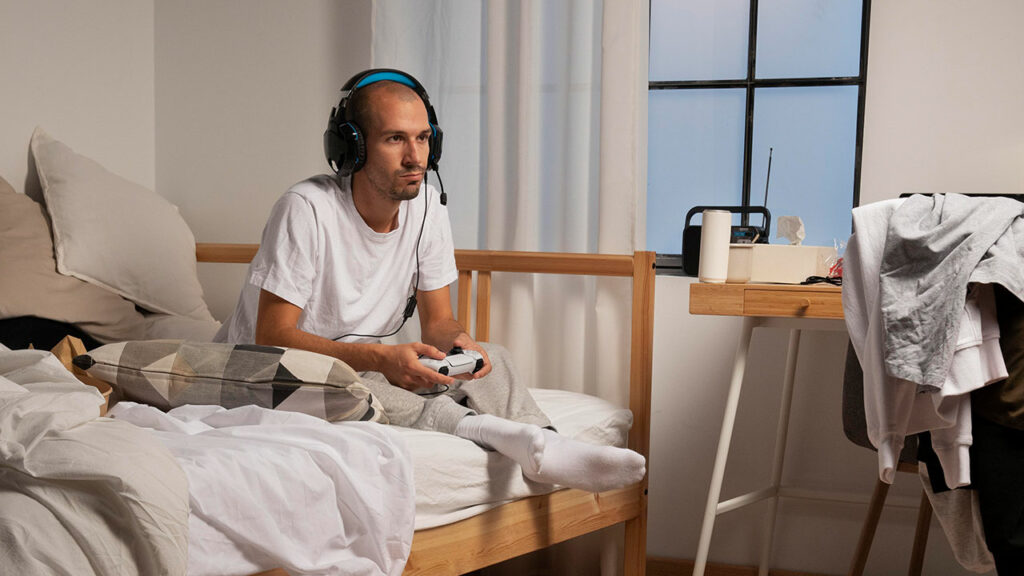
List of House Rules For Adults Living With Parents
Setting clear rules is a good way to take positive action if your adult child lives at home, especially if they’re addicted to playing video games. It can help reduce resentment about their lack of motivation to do anything other than game and create a calmer atmosphere.
But how do you set rules for adults living at home? In this article, we explain why having an open and honest discussion is important, and suggest some house rules you may want to adopt.
What should be expected of adult children living at home?

Whatever the age of your adult child, if they live in your home, they should expect to follow your rules. But, while trying to deal with their excessive gaming, you may have lost sight of how they can make a positive contribution to the household. Trying to introduce some clear boundaries can seem daunting, especially if they’re likely to cause more conflict.
In the short term, it may seem easier not to rock the boat, but it’s important that lazy adults living at home and gaming constantly start to take on some responsibilities. Not only will it provide a focus other than gaming, but it will also prepare them to live independently in the future.
How gaming addiction can impact families

Every week, we speak to families of gamers who don’t know where else to turn. Their adult children are gaming almost constantly, so they have no time in their lives for anything else.
Younger adults are neglecting their studies or may have already dropped out of college, while older adults are struggling to hold down a job, if they’re even working at all. Parents know that something has to change but feel powerless about what to do when nothing seems to work.
It’s often a relief when we explain that introducing some house rules may alleviate the hostile environment at home. Here are some common questions we get asked:
- Does my adult child have failure to launch syndrome?
- What are some acceptable rules for a “legal adult” child living at home?
- When should you stop helping adult children?
- What is adult child syndrome and does my child have it?
- What are some good house rules that have worked for other families of gamers?
5 good house rules for adult children living at home

Rather than presenting your adult child with a list of rules, it’s a good idea to have an open and honest discussion first. This should be a collaborative activity with no judgment about what has or hasn’t happened previously. It’s about drawing a line and agreeing on the best way forward so you can cohabit more harmoniously. You may even want to consider creating an adult child living at home contract together. Although this sounds a bit extreme, it can help to clarify everyone’s responsibilities and expectations.
So, how do you set house rules for adults living at home, and what are the most common house rules? While every family is different, here are some suggestions that can be adapted to most living arrangements.
1. Work toward a personal goal
If your adult child is stuck in limbo—gaming excessively and shirking school, work, or household responsibilities—then aiming for a personal goal can help them move forward. What do they want to do with their life? Can they achieve it by going to college, enrolling in a training program, or looking for a job?
Depending on the severity of their video game addiction, they may need some tailored support first. Factor this into a plan of action with an agreed timescale to achieve their goal, which could be to move out and begin an independent life. It’s crucial that they stick to the plan and resist the temptation to slip back into their old habits. Enlisting your help is fine, as long as they don’t rely on you completely.
2. Make a contribution to household costs
If your adult child lives under your roof, then it’s reasonable to expect them to make a financial contribution. However, something will need to change because they won’t be able to hold down a job if they’re gaming incessantly. The way you implement this rule is likely to depend on their situation; it may take a while to quit playing video games or at least reduce their reliance on gaming.
You could consider increasing the amount they have to pay each month so they have time to get their unhealthy habits under control. To avoid a confrontation whenever their contribution is due, set up a monthly transfer from their bank account to yours. If they need help finding work, these 10 tips for getting a job may be useful.
3. Do their share of chores
If your adult child lives with you full-time, they’re not a guest and should not be treated like one. Co-habiting means sharing the responsibility to keep your household functioning smoothly, and this involves more than simply cleaning up after themselves. Taking on communal household chores like grocery shopping, cleaning the bathroom, unloading the dishwasher, emptying the trash, and preparing meals will give them something to focus on other than gaming.
Draw up a chore chart together that involves every family member and sets clear expectations so everyone takes accountability for their tasks. This can help avoid frustration and resentment that the adult gamer is not pulling their weight.
4. Participate in family mealtimes
Gaming becomes an unhealthy habit when it starts to affect a player’s physical and mental health. They may stop eating nutritious meals and binge on fast food, soda, and caffeine instead. The urge to play can wreak havoc with their sleep schedule.
In the short term, this can cause irritability and exhaustion; in the long term, it can increase the risk of diabetes, obesity, and heart problems. Being shut away from other people and only having virtual interactions with strangers may also lead to loneliness and isolation. Over time, this may cause mental health problems. That’s why attending family meals is an important house rule. Setting a time for breakfast will get them out of bed in the morning, and coming together for dinner in the evening will provide structure to their day. It will also make them feel like they are part of the family again.
5. Review the rules together
Drawing up a list of house rules and then hoping for the best is unlikely to work. Make time to review what’s working and what’s not on a regular basis. This needs to be done in a relaxed way to minimize friction. Perhaps get together on neutral ground—go for a walk or meet up at a local café. Let everyone have their say; it’s all about give and take. When establishing your house rules, decide on the frequency of these reviews together. You might have them on a weekly basis to start with and move to fortnightly or monthly if everything is going smoothly.
Need help?

If you’ve tried to introduce house rules but your adult child refuses to stop gaming and start contributing, we can help.
Our coaching programs could be the change you need if you:
- Don’t want to continue arguing about gaming
- Don’t want to resort to rehab
- Don’t want to watch them waste their life any longer
Book a Gameplan call today to find out more about our tried-and-tested approach. During the conversation, we’ll explain the plan we’ll be implementing. If you think it’s a good solution to your problems, we can get started together. Please note, there are limited spaces available.
Don’t worry if your adult child is reluctant to get involved; we’re experienced at dealing with gamers in denial.
